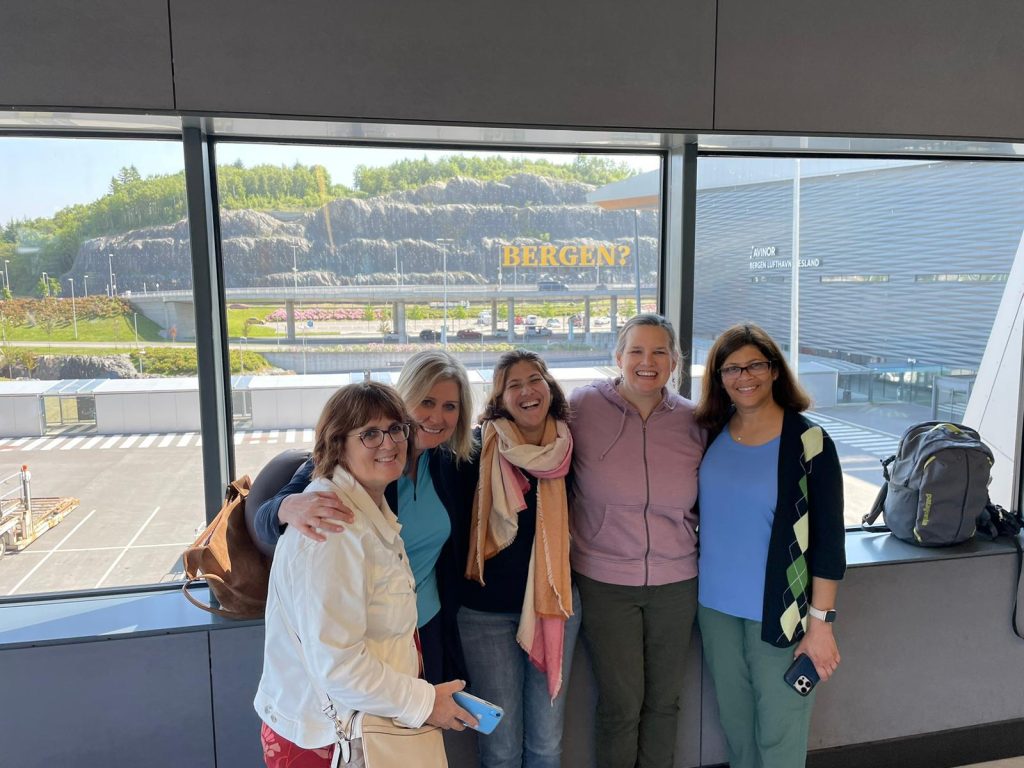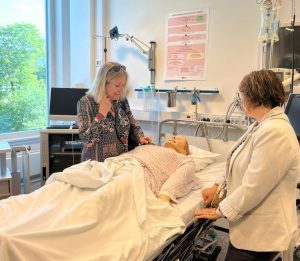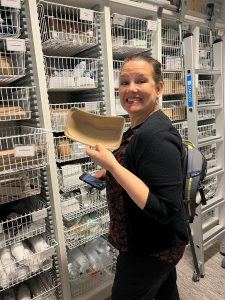Carolina Selected for Norwegian COIL Partnerships Initiative
August 7, 2023UNC Global Affairs
 UNC-Chapel Hill's Norwegian Panorama team in Bergen, Norway. From left to right: Catherine Crawford, Lisa Woodley, Manisha Mittal, Rhonda Lanning and Sharmila Udyavar. (Photo courtesy of Catherine Crawford)
UNC-Chapel Hill's Norwegian Panorama team in Bergen, Norway. From left to right: Catherine Crawford, Lisa Woodley, Manisha Mittal, Rhonda Lanning and Sharmila Udyavar. (Photo courtesy of Catherine Crawford)
UNC-Chapel Hill is one of 19 higher education institutions in the U.S., Norway and Japan selected to participate in the American Association of Colleges and Universities (AAC&U) Norwegian Panorama VE/COIL Partnerships Initiative. Five Carolina faculty and staff recently traveled to Norway to collaborate with the international partners.
The Initiative, sponsored by the government of Norway, is designed to strengthen higher education ties with the United States and Japan. It offers professional development and resources that support sustained international partnerships for Virtual Exchange (VE) and Collaborative Online International Learning (COIL). All of the participating institutions will develop new VE collaborations as a result of the Initiative.
COIL is a pedagogical approach to global learning that involves joint teaching and learning between faculty and students in two or more countries.
Sharmila Udyavar, associate director for global education in Office of the Vice Provost for Global Affairs (OVPGA), leads UNC-Chapel Hill’s COIL program and identified the AAC&U opportunity. As part of the Initiative, she traveled to Bergen, Norway for a June conference with Manisha Mittal, instructional design manager in UNC Digital and Lifelong Learning and COIL fellow for OVPGA, and three faculty members from the UNC School of Nursing: Catherine Crawford, Rhonda Lanning and COIL fellow Lisa Woodley. Since March, the UNC-Chapel Hill team joined partners from Norway and Japan for virtual workshops on COIL topics such as course design, developing learning outcomes and assessment and identifying strengths in global partnerships.

As a result of the Initiative, the Carolina group will introduce COIL into Nursing 482, Reproductive Health and Nursing Care of the Childbearing Family, a required course for all nursing undergraduates with more than 100 students enrolled each semester. To date Carolina Nursing has developed 10 COIL courses sponsored by OVPGA with international partners in numerous countries.
“OVPGA is very much invested in enhancing support for Carolina faculty to strengthen global learning across campus,” Udyavar said. “The Norwegian Panorama Initiative complements the robust set of professional development support that our office offers to faculty and helps the University deliver on its Global Guarantee – our promise that a global education is available to every student.”
Mittal noted that the opportunity brought new pathways for interdepartmental collaboration, which she views as integral to instructional design for global education.
“When we applied for the award, there were specific areas that each of us had to contribute to because the Initiative recognizes that in order to build something sustainable and scalable, it takes a village,” she said. “You really need to have administrative support, global partners, funding support, instructional tool and technology support, design thinking, and then the actual faculty and content expertise and implementation.”
The faculty said they gained valuable professional development by participating in the Initiative.
“I’m so grateful to have had an opportunity to take a deep dive and learn from the experts on bringing a new approach to the classroom,” Lanning said.
Starting this fall, Crawford and Lanning will engage their Nursing 482 students in virtual collaborations with students at Western Norway University of Applied Sciences (HVL).
Together the students will explore maternity and newborn healthcare, midwifery, the role of nursing and scope of practice in Norway and the United States, and geographic and sociocultural differences in healthcare. While visiting Bergen, the nursing faculty noticed, for example, that hospitals in Norway prioritize environmental sustainability by utilizing materials such as stainless steel and cardboard where the U.S. typically uses plastic.

“Our students are smart and receptive,” Woodley said. “They’ll be really great at thinking about why it is that we use plastic here and if there are better outcomes for our patients, our healthcare systems and the environment. If those ideas trickle down to our students, they will in turn have a ripple effect on their peers when they graduate.”
According to the American Hospital Association, culturally competent care leads to social, health and business benefits. It increases community participation and involvement in health issues, reduces care disparities in patients and improves service efficiency.
“When they graduate, they need to be able to go out to the workforce and provide the best care for patients,” Crawford said. “That’s why global experiences are so integral to educating our students as they prepare to become the best nurses they can be.”
Carolina Nursing hopes that future iterations of this course will collaborate with more than one international partner and aims to infuse global learning across all of their programs. Woodley emphasized that a global education is imperative for the next generation of nurses.
“These opportunities help students broaden their world view and develop cross-cultural communication and critical thinking skills,” Woodley said. “The skill development learned through COIL is essential in helping our students become better global citizens, global advocates and have a global nursing perspective. It’s not something that’s icing on the cake. It really is a foundational skill.”
